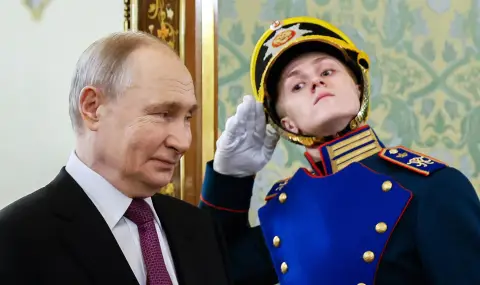Professor Carlo Massala from the Bundeswehr University is one of the most respected military analysts in Germany. DW spoke to him about his new book "If Russia Wins".
DW: You describe a scenario in which Ukraine is effectively forced to capitulate. Thus, the country loses more than 20 percent of its territory. You also write that if this happens, it will be tantamount to a Russian victory. Does it mean that Russia has already won?
K. Massala: If Russia keeps what it has occupied, this will already be a victory for it. The question of whether Russia has achieved its military goals or not is secondary, because a ceasefire, peace or whatever, will be the basis for Russia to consolidate its territorial gains.
DV: That is, Russian President Vladimir Putin could say: "Okay, let's just end this war". How likely is that?
K. Masala: At this stage, it is unlikely, because Putin has more distant goals. He also wants to get rid of President Zelensky. In other words, he wants a situation in which new elections are held in Ukraine. But he also has goals that go beyond Ukraine.
DV: You do not believe that the EU will continue to provide assistance to Ukraine as it has so far. According to your logic, this could happen because other governments will come to power in Europe, for example in France. And then it, and maybe other countries, will block aid to Ukraine. Is that right?
K. Masala: Yes, I suppose that if there is a ceasefire now and Russia behaves tactically competently, i.e. it does not give any signs that it will attack Ukraine again in the next two years, a discussion will very quickly begin in Europe whether aid to Ukraine makes sense. Is this not too much money that should actually be used for other purposes - for example, for social programs. I suppose that if Ukraine loses the war, populist or extremist parties will say that this could have happened three years ago. And I suppose that this will be heard. After that, these parties will strengthen in all elections.
DV: In your book you describe a scenario in which Russia attacks NATO three years after the ceasefire in Ukraine. And with the help of a deceptive maneuver on the part of China. How?
K. Masala: This is based on agreements. China's move is simply a diversionary maneuver. The second diversionary maneuver is that Russia itself is causing a migration wave from Africa to Europe. This is military logic: if I want to achieve my goal, it might be wise to tie down the enemy's forces somewhere else before launching the main attack.
DW: For those who haven't read the book, a brief explanation is needed. You assume that China seizes an island in the Philippines and thus engages Western powers, especially the United States.
K. Masala: Absolutely true. And in Europe, European powers are engaged in securing the Mediterranean region from a new migration wave. Is it so unlikely that China will help Russia? No, it is entirely likely, because China has its own territorial interests. And because the Chinese, like the Russians, have an interest in the world order changing in their favor.
DV: You also describe a hypothetical Russian attack on the Estonian border city of Narva and its rapid occupation. What would be the goal?
K. Masala: The goal is to test NATO, the resilience of the Alliance, which involves a very calculated risk for Russia. If I occupy a city in Estonia - Narva, which has a population of 50,000, and say that I want to protect the Russian minority, then this is a limited military action. And then I ask the question: how will NATO react? Will the alliance perceive this as an attack under Article 5 of the Collective Security Treaty, or will the forces that say it is not worth provoking a full-scale military conflict with Russia over Narva prevail?
If NATO with its three nuclear powers enters a full-scale conflict with nuclear-power Russia, the threat of the use of nuclear weapons always looms over this conflict, which ultimately, if we exaggerate, is the beginning of World War III. And Russia can assume that some NATO countries can say: we are not ready to die for Narva. If the Alliance still invokes Article 5, Russia can withdraw very quickly and NATO will never enter Russian territory. If Article 5 is not invoked, NATO will be finished.
DV: How can a scenario like the one you describe, with Russia's war against Ukraine, be prevented?
K. Massala: French President Macron said that it will probably take five to ten years before Europe becomes sovereign in terms of defense policy. And I would say that it is more likely to take ten years. But we only have three or four. This means that we now need to acquire as much equipment as possible as quickly as possible and integrate it into our armed forces.
Author: Roman Goncharenko
